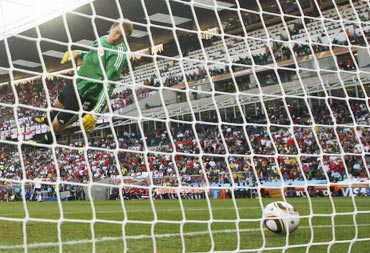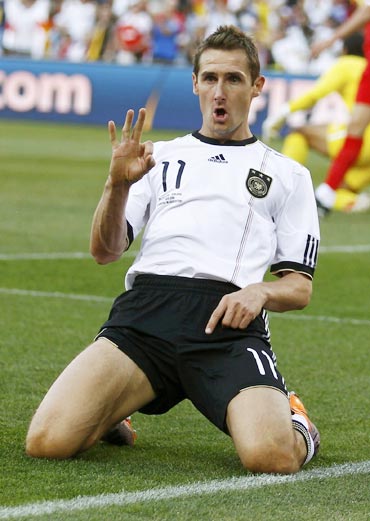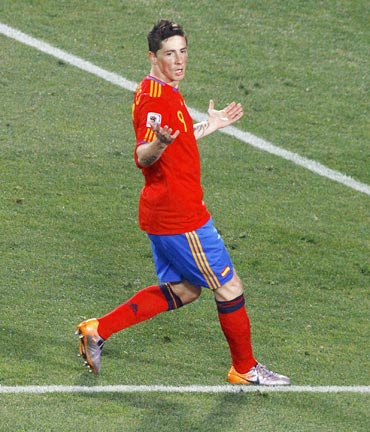
FIFA's refusal to use technology to help decide on close calls has left soccer isolated in major international sport, clinging to the idea that human error is somehow preferable to computer-backed truth.
While other sports have happily embraced the use of video replays or infrared systems to review goals and other close calls, earlier this year soccer's governing body ruled out the use of any such system for the foreseeable future.
The issue came into sharper focus than ever after decisions, shown by instant replays to be incorrect beyond any reasonable doubt, altered the balance of Sunday's two World Cup second round matches.
First it was a shot from Frank Lampard that clattered against the German crossbar and bounced down well over the line when England, chasing a comeback, were 2-1 down. Germany, clearly rattled at the time, went on to win 4-1.
In the later game at Soccer City, Mexico had been enjoying the better of the game against Argentina when Carlos Tevez scored from a clearly offside position, setting Diego Maradona's side on their way to a 3-1 win.

FIFA spokesman Nicolas Maingot was in an uncomfortable position on Monday when asked for a response.
He was unable to do anything but refer reporters to recent statements from FIFA President Sepp Blatter, who reiterated his opposition to the use of technology after the sport's lawmaking body decided against its introduction in March.
"The game must be played in the same way no matter where you are in the world," Blatter said on FIFA's website.
"The simplicity and universality of the game is one of the reasons for its success.
"No matter which technology is applied, at the end of the day a decision will have to be taken by a human being. This being the case, why remove the responsibility from the referee to give it to someone else?"
Critics among fans, players and coaches may argue that in certain cases, Sunday's games among them, giving the responsibility to someone else would lead to a more accurate decision.

Tennis and cricket are among the sports to have happily introduced infrared systems to track the ball, while rugby, NBA basketball and American football use video replays.
The current debate in MLB baseball is not whether the limited use of video to check questionable home runs should be scrapped but rather expanded to cover the sort of mistake that denied Armando Galarraga a perfect game.
At the Olympics, freeze-frames help decide places on the track, Formula One motor racing uses video and technical analysis to make calls long after the race is over, often affecting the results, and the list of sports embracing technology goes on and on.
By no means all World Cup players support the idea of using video evidence or other technology with some believing that luck evens itself out over time.

Germany midfielder Sami Khedira, who played in the England game, told a news conference: "We are quite happy the way it is because in the long run these things get balanced out. It's all part of the game and part of the emotion."
Plenty of people involved in the sport would clearly welcome it, however, including Khedira's team-mate Miroslav Klose.
"If technological solutions are there they should be used," Klose said.
"I'm not talking about TV evidence. I'm more talking about a chip in the ball or goal-line cameras. You see it in tennis and other sports, why not football?"
That question will have been asked by many fans, not to mention the Mexico players who saw the Tevez goal replayed on a giant screen at the stadium, sparking vehement protests.

FIFA's response was to say that such a controversial incident should not have been replayed, while promising to exercise more control on what goes on the big screen.
That would appear to be missing a point summed up by Spain striker Fernando Torres.
"We're tired of asking for technological help on these kind of situations," Torres said on Spanish radio.
"They can determine something as important as whether you get knocked out of a World Cup," he added.